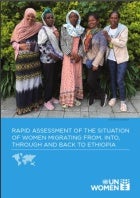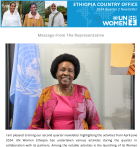1 - 16 of 16 Results
Date:
The rapid assessment provides an analysis of the situation of women migrating from, to through and back to Ethiopia based on existing literature and a review of relevant policies, legal frameworks and services related to migration governance in Ethiopia, with a gender lens. The assessment also proposes recommendations to strengthen the rights of migrant women at all stages of migration.
Date:
Drawing on the policy brief on advancing the rights of Ethiopian migrant women domestic workers the infographic illustrates the risk and realities facing Ethiopian women migrating for domestic work at all stages including pre-departure, during the journey, at country of destination and upon return and provides insights for action.
Date:
In 2022, MGCSW and UN Women South Sudan developed the Country Gender Equality Profile, highlighting progress and challenges in gender equality, women’s rights, and governance. The study calls for increased funding, legal reforms, and socio-economic initiatives to address issues like illiteracy, violence, and limited access to services. Collaborative action by the government, UN agencies, and civic groups is essential for promoting gender equality and safeguarding women’s rights. Key recommendations include allocating funding for violence survivors, establishing the Women Enterprise Fund, reviewing the Girl Child Act, and expediting gender-related laws. The government should lift social media bans, provide platforms for women’s voices, and promote women’s inclusion in constitution drafting. Efforts should also focus on disseminating the Maputo Protocol and defining the minimum marriage age to safeguard gender equality and women’s rights.
Date:
UN Women Ethiopia has undertaken various activities during the quarter in collaboration with its partners. Among the notable activities is the launching of its WomenEconomic Empowerment Strategy. The strategy encapsulates UN Women’s vision of empowering women to thrive and economies to prosper. It aims to dismantle the systemic barriers that prevent women from fully participating in the economy.
Another important work done during the quarter is the continuation of our effort to ensure the participation of Civil Society organizations in the transitional justice processes. To this end, a two-day national workshop on creating space for the CSOs to participate in the implementation process of transitional justice policy in Ethiopia was held in June 2024. The workshop targets women leaders from non-governmental and CSOs and representatives of grassroots community groups aimed to assess gender sensitivity of the Transitional Justice (TJ) Policy recently adopted by Ethiopia’s Council of Ministers.
Date:
This analysis aims to gain insights into the unique challenges, needs, and priorities of women, girls, men, and boys. It seeks to guide humanitarian, development, and peace actors in tailoring their responses to effectively meet the diverse needs of returnees, refugees, displaced populations, and host communities.
Date:
This analysis aimed to assess the impact of the conflict in the Greater Pibor Administrative Area (GPAA), including key protection risks and needs, and to identify triggers of the conflict.
Date:
Accessing accurate information on and services for regular migration is not easy; Ethiopian women may rely instead on informal networks and unregistered recruitment agencies. Ethiopian migrant women travelling via irregular overland routes, as opposed to travelling by plane, face high risks of sexual and gender-based violence, including trafficking for forced labour and sexual exploitation. Upon reaching their destination countries and taking up domestic work, they often face abusive and exploitative situations. Health issues, including physical injuries and high rates of suicide, are widespread among Ethiopian migrant women domestic workers. Despite these harsh realities, some women secure relatively high salaries in comparison to those in Ethiopia and send significant portions of their salaries home to support their families. Upon returning to Ethiopia, many women face stigma, limited economic opportunities and psychological distress. Limited gender-responsive reintegration support further complicates their efforts to rebuild their lives and attain economic independence.
Date:
The ultimate goal is that women and girls in Sudan benefit from gender-responsive humanitarian action and targeted assistance that responds to their basic needs, and from opportunities for their meaningful participation in peace, political and humanitarian processes.
Date:
This brief emerges from Regional Gender Assessment of the Impact of Sudan Conflict on Women and Girls in Sudan and its Neighboring Countries. It provides the findings and recommendations of the regional gender analysis of the Sudan conflict, which UN Women conducted between July and August 2023.
Date:
This brief emerges from the Assessment of National Responses and Strategies on Trafficking in Persons and Migration, with a specific focus on the vulnerabilities of women and girls to all forms of exploitation.
Date:
The factsheet provides a brief overview of the Making Migration Safe for Women programme implementation focus, activities and stakeholders involved.
Date:
This policy brief highlights the main findings of four academic research papers on the Women, Peace and Security (WPS) agenda that were presented during a workshop organized by UN Women Ethiopia Country Office in December 2021.
The findings focus on protection of women from conflict-related sexual violence; gender-sensitive recovery programs; role of women human rights defenderds in supporting the WPS agenda; and awareness of Members of Parliament on the agenda.
Date:
This factsheet offers some insights into migrant women’s experiences in Niger, based on the limited data that is available on this topic. It was prouced as part of the Making Migration Safe for Women programme which aims to ensure that migration is safe for women migrating from, into and through Niger and that international norms and standards for protecting and promoting migrant women’s rights are strengthened. Read/Download : EN
Date:
This report highlights UN Women Nigeria’s work for the year 2020. The report builds around the Nigeria Country Office programmatic areas of intervention and reflects the achievements attained in collaboration with various government and non-governmental partners who contributed to policy advocacy efforts, delivery of services, implementation, and funding of interventions aimed at promoting gender equality and women’s empowerment. The population at large (men, women, boys...
Date:
This two-pager provides an overview of the Making Migration Safe for Women (MMS) program in Niger. The overarching goal of the program is to ensuring that migration is safe for women migrating from, into and through Niger and that international norms and standards for protecting and promoting migrant women’s rights are strengthened. The program will support the Nigerien government in strengthening its migration policies, laws and services to ensure they are gender-responsive, as well as...
Date:
This Rapid Assessment, the first of its kind in Niger, aims to highlight the challenges that women may face migrating from, into and through the country. It has been developed based on a desk review of existing literature as well as information received from questionnaires completed by relevant governmental and non-governmental organizations and interviews with UN agencies and other development partners. However, the availability of comprehensive sex-disaggregated data in Niger is limited. As...
















